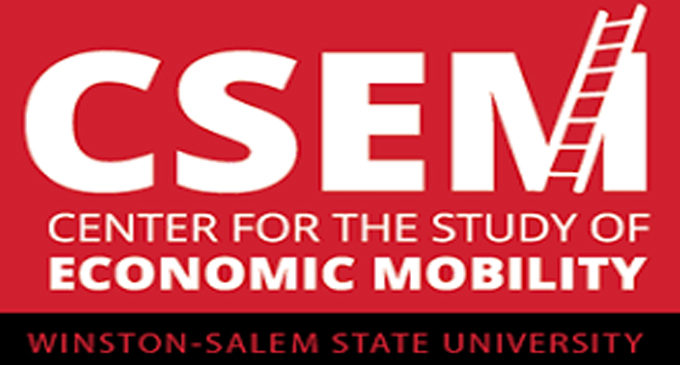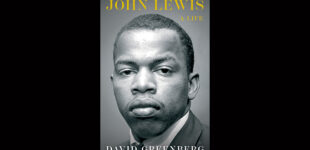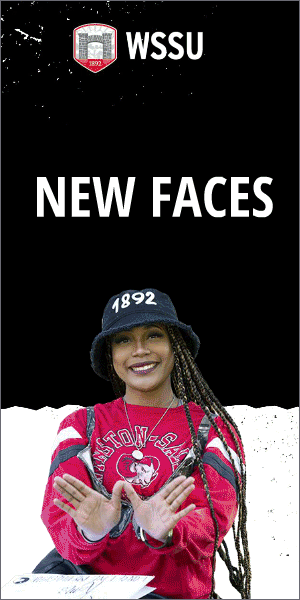The 2020 CSEM Community Scholars: ‘Just look for the hope. It’s out there.’

By John Railey
Stephanie Hurt, the director of a nonprofit that puts on plays, sees hope as her contract actors and staff help out at COVID-testing sites and plan more plays. Michael Banner, the director of a nonprofit that battles food insecurity, has a realistic view of hope as his agency works to expand the number of urban gardens and other strategies. David Moore, the director of an organization that puts released offenders to work, sees hope as his organization grows to include a new program for at-risk youth.
“We’re still doing plays and our people are excited to go to work,” Hurt, who leads the Royal Curtain Drama Guild, said. “They want people to know: Just look for the hope. It’s out there.”
Hurt, Banner and Moore are the 2020 Community Scholars affiliated with Winston-Salem State University’s Center for the Study of Economic Mobility (CSEM). CSEM Associate Director Alvin Atkinson, who administers the Community Scholars initiative, said, “Community Scholars is a way to shine a light on the ‘I’ in our ‘BIG’ Idea in Community Engagement.
“The Community Scholars’ designation was created in combination with Economic Mobility Opportunity Awards, in recognition of the value of knowledge obtained by individuals through their understanding and expertise that emerge through life experiences and contribute to the public good for East Winston residents in areas that contribute to improving economic mobility opportunities; education, self-efficacy and healthy minds and bodies,” Atkinson said. “All of these are positive ingredients in harnessing hope, making the invisible visible. The hope is there, proved by two recent studies.”
The first is a 2017 study commissioned by CSEM. Five hundred participants agreed, for the most part, that hard work leads to success, and that they can achieve whatever level of education they would like. A national study conducted in 2019-20, the Center for Advancing Opportunity’s Gallop Survey, complemented the local study. That national study, based on a representative survey of nearly 7,000 residents of fragile communities in 47 states and the District of Columbia, found that 70% of those residents are confident in their ability to improve their own lives.
Hurt, Banner and Moore are not surprised. They see that hope – as well as talent – every day in East Winston, an area too often discounted by residents of other areas of the city and Forsyth County. “These are the kind of leaders East Winston needs,” Atkinson said.
Hurt saw the hope this spring and winter, as her organization, the Royal Curtain Guild, put on two socially-distanced plays, harnessing local talent and dreams and not letting the pandemic stop them. She saw the hope again just the other day, as eight contract workers from her group – actors and other workers – continued their assistance at a local COVID-testing site. Her son, Joel Hurt, the choreographer for the group, told his mother he consoled a man waiting in line to be tested. “He said, ‘Mom, one of those men was really scared. I told him, ‘It’s OK, you’re going to be fine,’” Stephanie Hurt said.
Michael Banner leads the nonprofit IslandCultureZ, which works to ensure East Winston residents have access to healthy food. For five years, Banner and his board chairman, Marcus Hill, have been chipping away at food insecurity. During the pandemic, the organization has partnered with community residents to donate food to residents in need. In the New Year, the organization wants to continue its efforts in marginalized communities, concentrating on urban gardens and more accessible farmers’ markets. It is crucial work in East Winston, which has a high number of food deserts. Banner is realistic about the challenges they face.
“’Hoeing in a scanty way’ won’t be sufficient in shifting the needle to make a high priority of grassroot efforts to galvanize the people to move towards self-sufficiency in our city; we will have to employ a pick axe and a spade to really dig up the roots of the invasive weeds left by the institutions posturing to be solving the perpetual poverty, but are in fact profiting off of the people’s mulched dreams and composted realities,” he said.
David Moore is well-known as the head of Southside Rides, which puts released offenders to work in its body shop. He has renewed focus on an initiative of his foundation, Project M.O.O.R. E., the second word standing for Mentoring Our Own and Rejuvenating the Environment. He has transformed an old frame house just off Martin Luther King Drive into a spot where youth can gather, learn and dream, charting plans for careers with on-site training in barbering, cosmetology and music. The first session of the program begins this month.
“I see the hope anywhere that the people are out there fighting for it,” Moore said. “There’s an abundance of talent in East Winston. And we’re getting ready to tap into it.”
John Railey, raileyjb@gmail.com, is the writer-in-residence for CSEM, www.wssu.edu/csem.












